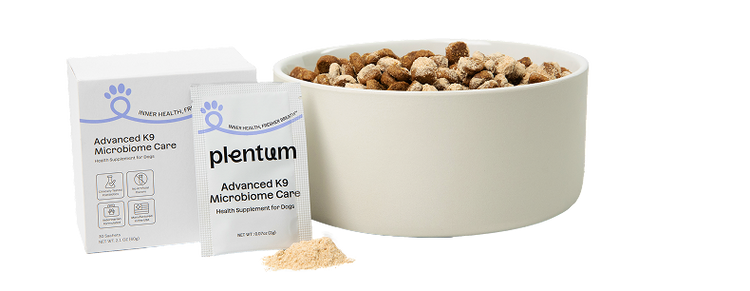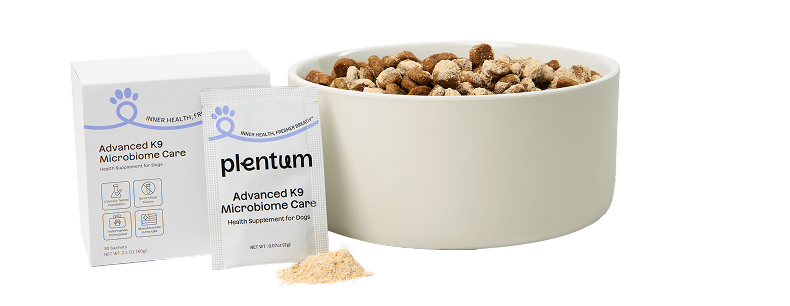The process of selecting appropriate dog food for gut health maintenance proves to be extremely challenging. The pet food section contains an overwhelming number of confusing product labels. Pet owners face a "trust gap" because marketing terms such as "Grain-Free" and "All-Natural" and "Human-Grade" do not reflect scientific evidence about dog health.
The majority of marketing terms in pet food products serve human preferences instead of addressing canine health needs. Your dog's wellness depends on maintaining a healthy gut microbiome which functions as a balanced ecosystem.
Why Is Finding Gut Health Dog Food So Confusing?
The process of selecting appropriate gut health dog food remains extremely difficult for pet owners.
The marketing industry uses several terms which do not match their actual meanings.
-
The "Grain-Free" Myth: The marketing trend of grain-free diets lacks scientific evidence to support their claimed benefits. The majority of dog food allergies stem from protein sources including chicken and beef instead of grains.
-
The "All-Natural" Label: The AAFCO defines this term to mean products contain only plant-based and animal-based and mineral-derived ingredients. The label does not indicate product safety or quality because it permits manufacturers to add synthetic vitamins and minerals.
-
The "Human-Grade" Hype: The term "human-grade" indicates that the ingredients used in pet food are safe for human consumption. The digestibility of food improves when using human-grade ingredients but this does not ensure the product meets canine nutritional requirements.
-
The "Real Meat First" Tactic: Pet food regulations enable companies to use actual meat products instead of synthetic alternatives. The first listed "chicken" ingredient contains significant water content. The protein content in "chicken meal" products located further down in the ingredient list might exceed what is found in the initial "chicken" ingredient.
What Is the Canine Microbiome (And Why Does It Matter)?
The Canine Microbiome functions as a vital system which scientists recognize as the primary factor for health maintenance. The canine microbiome exists as a complex bacterial and viral and fungal community which scientists call the "forgotten organ" because it resides inside dogs.
A well-functioning microbiome serves three essential purposes to maintain true wellness in dogs.
-
Metabolism: The microbiome breaks down nutrients while producing beneficial compounds through fiber fermentation into short-chain fatty acids (SCFAs).
-
Pathogen Protection: The microbiome creates a protective barrier which stops dangerous bacteria from dominating the system.
-
Immune System Education: The immune system receives its education from the microbiome which enables it to achieve proper balance and function. The immune system depends on the gut for more than 70% for its operation.
When the microbiome balance becomes disrupted it leads to widespread health problems throughout the body.
Common Signs of an Unhealthy Gut in Dogs:
-
Obvious Signs: The most noticeable symptoms include diarrhea and constipation and excessive gas production and vomiting.
-
Hidden Signs: The following signs of gut health issues in dogs even though they do not show obvious symptoms: Bad breath (oral-gut axis), chronic skin itching (gut-skin axis), rashes, recurrent ear infections, and behavioral changes like anxiety (gut-brain axis).
How Can You Actually Improve Your Dog's Gut Health?
The process of enhancing dog gut health requires support for the microbiome system. The biotic trinity consists of prebiotics which serve as food for good bacteria and probiotics which are live beneficial bacteria and postbiotics which produce stable beneficial compounds.
-
Prebiotics (The "Fuel"): The good bacteria in your dog's gut receive their food supply from plant fibers which include Inulin extracted from chicory roots.
-
Probiotics (The "Factory"): The "good" bacteria which exist as living organisms make up this category. The main difficulty with probiotics stems from their unstable nature. The living nature of probiotics makes them vulnerable to destruction by heat and processing and stomach acid before they can start their work.
-
Postbiotics (The "Product"): These beneficial compounds emerge from probiotic activity as the useful outcomes. The beneficial compounds produced by probiotics include SCFAs and enzymes and peptides. The inanimate nature of these compounds makes them resistant to heat and stomach acid so they can provide dependable support to the gut barrier and immune system.
Prebiotics vs. Probiotics vs. Postbiotics
| Feature |
Prebiotics (Fuel) |
Probiotics (Factory) |
Postbiotics (Product) |
| What It Is |
Plant fibers (food for bacteria) |
Live, "good" bacteria |
Inanimate beneficial byproducts |
| Function |
Nourish existing good bacteria |
Add new bacteria to the gut |
Deliver direct immune & gut support |
| Key Challenge |
Must be balanced |
Fragile; sensitive to heat & acid |
Highly stable and reliable |
A Root-Cause Solution for Total Gut Health
The science-based approach to dog gut health requires specific food ingredients. The complete microbiome support of Plentum's all-in-one supplement operates as a complete system. The supplement begins by offering Inulin as a powerful prebiotic which supports digestive health. The supplement contains Colostrum Powder and L-Glutamine to protect the gut lining and immune system.
The product delivers its main advantage through complete gastrointestinal system support which begins in the mouth. The majority of dogs develop periodontal problems which affect their dental health before reaching their second birthday. The Canine Oral Health Postbiotic in Plentum's formula represents a groundbreaking innovation. The supplement stands out as an excellent gut health product for dogs because it contains the first proven compound which targets harmful bacteria that cause dental problems.
The Best Dog Food for Gut Health Starts with Science
The foundation of excellent dog food for gut health requires scientific evidence. The best dog food for gut health requires actual support of digestive health rather than exclusion of certain ingredients. Your dog will receive essential digestive and skin and oral health benefits through microbiome-focused wellness solutions.
Frequently Asked Questions (FAQ)
1. What is the best dog food for gut health?
The best food for dogs should contain balanced nutrition that supports their microbiome instead of relying on marketing trends. The combination of prebiotics and postbiotics in dog food provides proven support for gut health.
2. How can I improve my dog's gut health?
Your dog will achieve better gut health through eating a balanced diet and exercising while taking a complete supplement which contains prebiotics and postbiotics to support their microbiome.
3. What are the signs of an unhealthy gut in dogs?
The symptoms of an unhealthy gut in dogs include diarrhea and gas and vomiting but also include systemic problems like bad breath and chronic skin itching and anxiety which stem from microbial imbalances.
4. Are probiotics or postbiotics better for dogs gut health?
Postbiotics outperform probiotics because they maintain their stability during heat exposure and stomach acid contact which enables them to provide dependable immune system and gut barrier support.
5. What are the best gut health supplements for dogs?
The most effective dog gut health supplements contain prebiotics with Inulin and postbiotics which work together to support the complete gut and oral microbiome system.
References
- AAFCO. (n.d.). Natural. Association of American Feed Control Officials. https://www.aafco.org/consumers/understanding-pet-food/natural/
- Cummings School of Veterinary Medicine. (n.d.). Nutrition FAQs. Tufts University. https://vet.tufts.edu/foster-hospital-small-animals/specialty-services/nutrition/nutrition-faqs
- Grześkowiak, Ł., et al. (2015). Role of gut microbiota in dog and cat's health and diseases. PMC - NIH. https://pmc.ncbi.nlm.nih.gov/articles/PMC6794400/
- Wegh, C. A. M., et al. (2019). Postbiotics and Their Potential Applications in Early Life Nutrition and Beyond. Frontiers in Immunology. https://www.frontiersin.org/journals/immunology/articles/10.3389/fimmu.2019.02007/full









